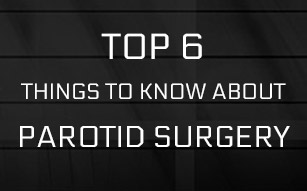FAQs
If you have received a diagnosis concerning the parotid gland, or suspect something may be wrong, it is important to speak with an expert parotid surgeon about your treatment options.
Dr. Larian and his team of specialists encourage patients to ask questions and become as educated as possible on their condition and necessary procedures, to ensure they make informed decisions and receive the best care possible. To that end, here are a few of the most frequently asked questions the CENTER receives regarding parotid surgery:
Why is parotid surgery performed?
Parotid surgery is most commonly performed to remove a benign or cancerous parotid tumor. Other reasons include the removal of cysts in the parotid gland, or to treat excessive inflammation and infection.
What is the best surgery to remove a parotid tumor?
A minimally-invasive procedure, called a micro-parotidectomy, is the ideal surgery to remove parotid tumors because it minimizes scarring, reduces pain, preserves the facial nerve, improves aesthetic results, and decreases recovery time.
How will I know if my parotid tumor is cancerous?
If you have been diagnosed with a parotid tumor, Dr. Larian will perform a needle biopsy in office to determine whether the mass is cancerous or benign. The team at the CENTER will then use the findings from the diagnostic procedure to compose an appropriate surgical plan.
How long will I be hospitalized?
Most patients have the surgery performed at an outpatient surgery facility, which means they are able to go home within a few hours of surgery. In rare cases, if the patient is elderly or has other medical issues, an overnight hospital stay may be required.
What type of anesthesia will be used?
General anesthesia is used in all cases to ensure the patient is completely asleep during the procedure. Local anesthesia is not appropriate during parotid surgery because it prevents the facial nerve from being monitored - a critical part of preserving facial function and ensuring an optimal surgical outcome.
Can a facelift be performed at the same time?
Yes. In fact, if a patient is considering a facelift, the ideal time is during the parotid surgery to ensure an optimal cosmetic results. This is because parotid surgery - like all surgeries - results in scarring underneath the surface of the skin. This makes it challenging to create symmetry with a facelift at a later time because the skin and tissues on the non-parotid tumor side will be much healthier than the skin and tissues on the side of the face that is affected by deep scaring.
What can I expect during recovery?
Following parotid surgery, or parotidectomy, recovery will vary based on the complexity of the procedure and condition being treated. However, due to Dr. Larian's advanced use of minimally-invasive techniques, patients can typically look forward to a swift and easy recovery.
In most cases, minor discomfort during the first few days is to be expected, along with swelling that may last for a couple of weeks. Within two weeks, most patients can return to work and resume vigorous activities.
Request your consultation today
Call us at (310) 461-0300 to schedule an appointment.
Schedule a Consultation >>















